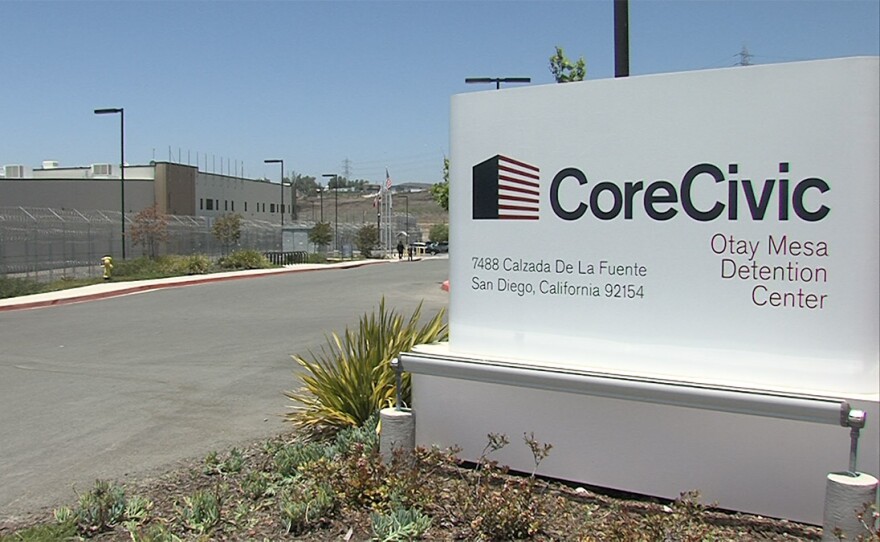Immigration and Customs Enforcement (ICE) and the private prison company Corecivic are asking church volunteers at an Otay Mesa detention center to sign a form that forbids them from talking to the press about conditions inside. The group is refusing to sign, and the American Civil Liberties Union is threatening a lawsuit.
The church volunteers visit detained immigrants and listen to their stories every month. It’s a program called SOLACE, an acronym for “Souls Offering Loving And Compassionate Ears," through the First Unitarian Universalist Church.
“Without Solace visitors, the people we have been visiting have little to no communication with the outside world," said program coordinator Angela Fuji. "Phone calls are prohibitively expensive, it costs money to buy a letter, you have to be able to buy the stamps."
Sometimes, the 20 or so monthly volunteers hear stories from the detainees about medical neglect, insufficient hygiene products and other problems in the facility — and share them with the public.
But since August, the volunteers have been denied access to the immigrant detainees for refusing to sign a new Corecivic form that states: "I will have no media contact related to the services I provide or any information I gain as a result of having access to the facility, the inmate population, or facility staff."
Fuji said the church volunteers won't sign this form because they believe it would interfere with their "moral duty" to be a "supporting presence" for the immigrant detainees. She added:
"We know that detention facilities are shadowy places because there is very little to no oversight by the government and one of the roles that we as visitor volunteers play is to be able to shine a little bit of light and also accompany people who are extremely isolated," she said. "We are not willing to accept the confidentiality agreement."
Corecivic spokeswoman Amanda Gilchrist said the guidelines "are for the personal safety and protection of the detainees." ICE says that due to 2016 revisions to the agency's detention standards, "all volunteers, including religious leaders/clergy/laypeople must be approved prior to conducting services at the facility."
The ACLU sent ICE and Corecivic a letter on Nov. 1, addressed to ICE assistant officer in charge Mark Paramo and Corecivic warden Fred Figueroa, threatening a lawsuit if the policy is not revoked by Nov. 15. David Loy, legal director of the ACLU in San Diego, called the new restriction a violation of First Amendment rights.
"It's outrageously unconstitutional to require individuals to refrain from disclosing information on matters of public concern about conditions of detention or potential abuses suffered by detainees," Loy said.
He said it reflects a longstanding "pattern and practice in immigration enforcement agencies and the private prison industry to evade transparency and accountability."
Weekly stakeholder tours of the facility were also limited this summer, according to several community members who contacted KPBS. ICE said this was "due to a significant number of requests and limited staffing resources." The agency said it was reviewing the letter from the ACLU.
Corecivic is already facing a lawsuit for alleged forced labor at the Otay Mesa detention facility.






